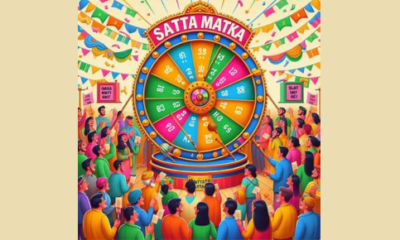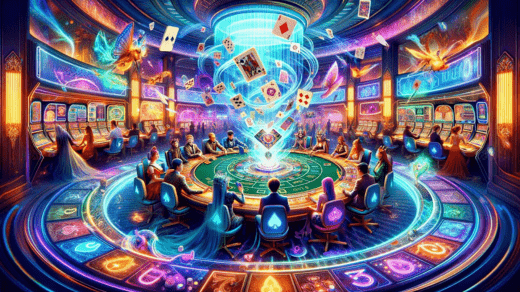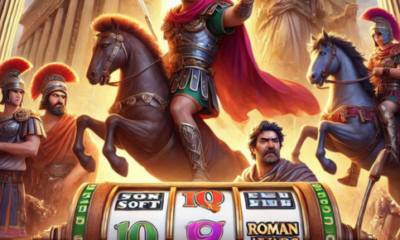Gaming
The Psychological Aspect of Satta: Understanding the Mindset of Indian Gamblers
Gambling has been a part of human civilization for centuries, captivating individuals with the promise of wealth and fortune. In recent years, the popularity of SattaMatka, a form of gambling, has grown exponentially in India. Beyond the economic implications, Satta holds a profound psychological aspect that influences the mindset of Indian gamblers. This article delves into the intricate psychological dynamics that drive individuals to engage in Satta and sheds light on the consequences it may have on their mental well-being.
In the vast landscape of gambling, Satta stands as a prominent activity in India. It is a form of betting based on the outcome of various events, such as the closing stock price of a particular market or the winning number in a game of chance. Satta has gained significant popularity due to its blend of excitement, thrill, and the potential to win substantial amounts of money. However, beneath the surface, there lies a complex web of psychological factors that draws individuals into this world of uncertainty.
What is Satta?
Before delving into the psychological aspects, it is crucial to understand what sattamatkà truly entails. Satta, derived from the Hindi word for gambling, refers to a vast network of speculative markets that operate both offline and online. It involves placing bets on specific outcomes, with winnings determined by the odds set by bookmakers or the speculative market itself. Satta covers a wide range of activities, including betting on sports events, lotteries, and even speculative trading in the stock market.
The Rise of Satta in India
The proliferation of Satta in India can be attributed to various factors. Historically, gambling has been a part of Indian culture, deeply ingrained in myths, folklore, and religious texts. The advent of technology and the internet has made Satta more accessible, attracting a broader audience. Additionally, the allure of quick money and the influence of popular media, such as movies and television shows, have contributed to the surge in Satta’s popularity.
The Psychological Attraction of Satta
Thrill and Excitement
One of the primary reasons individuals engage in Satta is the thrill and excitement it offers. The adrenaline rush experienced when placing bets and awaiting the outcome creates a sense of anticipation and euphoria. This emotional roller coaster can be addictive, compelling individuals to chase the thrill and replicate the experience repeatedly.
Escape from Reality
Satta provides an escape from the pressures and monotony of everyday life. It offers a temporary reprieve from responsibilities and allows individuals to immerse themselves in a world of uncertainty and risk. This escapism serves as a form of entertainment and distraction, offering a break from the mundane routines.
Greed and the Desire to Get Rich Quick
The allure of wealth and the desire to improve one’s financial status are significant psychological factors driving individuals towards Satta. The prospect of winning a substantial amount of money overnight fuels dreams of a lavish lifestyle and financial freedom. The pursuit of quick riches can cloud judgment and override rational decision-making, leading to impulsive and risky behavior.
Peer Pressure and Social Acceptance
Peer pressure plays a vital role in the participation of Satta. The need for social acceptance and the fear of missing out on potential gains can be powerful motivators. Individuals may feel compelled to engage in Satta to align with their peers, be part of a social circle, or gain social status. This pressure can create a psychological need to conform and participate in gambling activities.
The Mindset of Indian Gamblers
Understanding the mindset of Indian gamblers is essential to comprehend their motivations and behaviors.
Risk-Taking Behavior
Indian gamblers often exhibit a propensity for risk-taking behavior. The allure of high stakes and the excitement of uncertainty drive them to take calculated risks. The willingness to embrace risk, even in the face of potential losses, is a defining characteristic of the gambling mindset.
Belief in Luck and Destiny
Indian culture has a strong belief in luck and destiny, and this belief system permeates the gambling mindset. Many gamblers place their faith in luck, hoping for favorable outcomes. This reliance on external forces beyond their control provides a psychological comfort, even in the face of unfavorable odds.
Emotional Roller Coaster
Engaging in Satta can take individuals on an emotional roller coaster ride. The highs of winning can elicit feelings of joy, triumph, and euphoria, while the lows of losing can lead to disappointment, frustration, and even despair. This emotional volatility can create addictive patterns as individuals seek to recreate the positive emotions associated with winning.
The Impact of Satta on Mental Health
While Satta may provide short-term excitement and financial gains for some, its impact on mental health should not be underestimated.
Addiction and Dependency
Satta can lead to addictive behaviors and dependency. The repetitive cycle of placing bets, the anticipation of winning, and the subsequent reward activates the brain’s reward system, releasing dopamine—a neurotransmitter associated with pleasure and motivation. Over time, this can lead to addiction, with individuals chasing the thrill and engaging in compulsive gambling.
Financial Stress and Anxiety
Satta’s unpredictable nature can inflict significant financial stress on gamblers. Losses can accumulate rapidly, leading to debt, financial instability, and anxiety. The pressure to recoup losses or sustain a gambling habit can exacerbate these financial stressors, contributing to a vicious cycle of anxiety and further gambling.
Relationship Strain
Gambling addiction can strain relationships, causing rifts between family members, friends, and loved ones. The secrecy, lies, and financial strain associated with Satta can erode trust and lead to conflicts. The consequences of gambling can extend beyond the individual, affecting the well-being of those around them.
Coping Strategies and Support Systems
Recognizing the detrimental impact of Satta on mental health, individuals caught in the grip of gambling addiction can employ various coping strategies and seek support.
Seeking Professional Help
Professional intervention, such as counseling or therapy, can be instrumental in addressing gambling addiction. Trained professionals can assist individuals in understanding the underlying psychological factors driving their gambling behavior and provide strategies to break free from the cycle of addiction.
Self-Reflection and Awareness
Developing self-awareness is a crucial step towards overcoming gambling addiction. Individuals can reflect on their motivations, triggers, and emotional patterns associated with Satta. This introspection can help them gain a deeper understanding of their gambling habits and take proactive steps towards recovery.
Engaging in Healthy Alternatives
Finding healthier alternatives to replace the adrenaline rush of gambling is essential. Engaging in physical exercise, pursuing hobbies, and participating in social activities can provide alternative sources of pleasure and fulfillment. These activities can help individuals redirect their focus and regain a sense of control and purpose.
Support from Family and Friends
The support of loved ones is invaluable when combating gambling addiction. Family and friends can offer a listening ear, emotional support, and accountability. Building a strong support system can provide individuals with the encouragement and motivation needed to overcome the challenges associated with Satta.
The Role of Government and Regulatory Bodies
The government and regulatory bodies play a crucial role in addressing the psychological and societal impact of Madhur Bazaar. Implementing effective regulations, creating awareness campaigns, and providing resources for addiction treatment are essential steps towards curbing the negative consequences of gambling. Striking a balance between maintaining personal freedom and protecting individuals from the potential harm of gambling is a significant challenge that requires collaboration between various stakeholders. The psychological aspect of Satta highlights the powerful forces at play in the minds of Indian gamblers. The thrill, escapism, and desire for quick wealth drive individuals to engage in this high-stakes activity. However, the consequences on mental health, relationships, and overall well-being cannot be ignored. Understanding the psychological underpinnings of Satta can pave the way for effective intervention, support, and regulation to mitigate the potential harm associated with gambling addiction.




















You must be logged in to post a comment Login